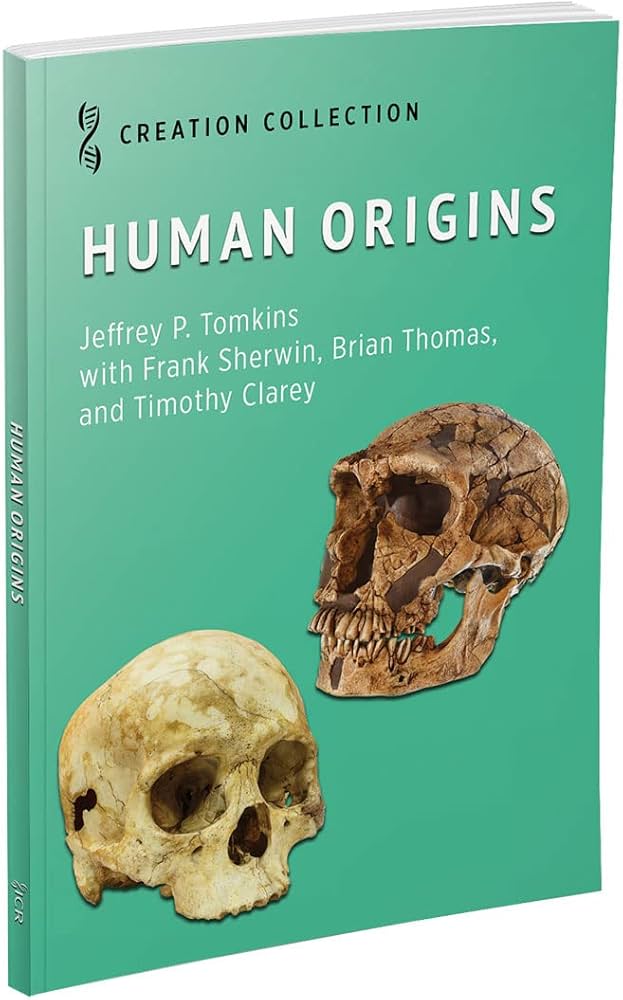“Everybody” knows, one might suppose, that evolution is about facts and the creation model is about belief. Certainly this was the message of the recent PBS TV series entitled “Evolution” which aired in September 2001. Indeed information sent to all the PBS stations stated this very thing: “All known scientific evidence supports evolution…. New discoveries over the past 150 years have all supported the validity of the theory of evolution.” (PBS Internal Memo. 2001. The Evolution Controversy: Use it or Lose it. Evolution Project / WGBH Boston. p. 5. June 15.) The memo further defined a scientific theory as a “higher level of understanding that ties ‘facts’ together.” (p. 5). As to the creation model, the memo dismissed it as “not science. It is part of a religious belief system…” (p. 6). Such statements and other similar ones over the years have convinced many among the public that science in general and evolution in particular are based on observations from the natural world and thus they are empirically or factually based. The interesting thing is that this is not the modern understanding of science among scientists themselves. They have long since abandoned much concern for actual data.
The modern outlook on science is readily apparent from remarks by scientists about their discipline. It was David Hull, a well known philosopher of science, who wrote as early as 1965 that “… science is not as empirical as many scientists seem to think it is. Unobserved and even unobservable entities play an important part in it. Science is not just the making of observations: it is the making of inferences on the basis of observations within the framework of a theory.” (D. Hull. 1965. British Journal for the Philosophy of Science 16 # 61 p. 6). Within this statement we see what appears to be a balance between facts and interpretation or theory. Dr. Hull however had an unusual idea about data. Concerning the concept of descent with modification from a common ancestor (phylogeny or evolution), he had written: “the first factor in the phylogenetic program and the only one that is of an empirical nature is phylogeny, but even phylogeny is not a brute fact to be discovered merely by looking and seeing. Phylogeny, the subject matter of phylogenetic taxonomy, is an abstraction. It is an abstraction in two respects. First, it is inferred almost exclusively from morphological, genetical, paleontological and other types of evidence and is not observable directly.” (D. Hull. 1964. Systematic Zoology 13 #1 p. 1.) His data, we discover, were merely conclusions not directly indicated by the evidence.
Views on the nature of science were actually in a state of flux at the time that Dr. Hull wrote these papers. Karl Popper in 1934 had pointed out that no theory in science could ever be proven true. The only alternative, he suggested, was to try to prove that theories were false. Those theories which could not be falsified or disproven on the basis of experimental data, would then qualify for the term “scientific”. The only catch was that many areas of research did not meet these criteria. Theories which could not be falsified, were said to be metaphysical (belief-based) rather than scientific. Accordingly an editorial in the scientific journal Nature in 1981 pointed out that Darwinism and the idea that God created the world, were both metaphysical theories since “the course of supposed past evolution cannot be rerun.” (Nature 290 p.75 March 12, 1981.) However such embarrassing characterizations of Darwinism as non-scientific were on their way out. Thomas Kuhn had published his book The Structure of Scientific Revolutions in 1962 thereby ushering in a post-empirical age in scientific understanding.
According to Thomas Kuhn, all science must be conducted in terms of a unifying set of ideas. Without such a theoretical system, said Kuhn, facts were meaningless and science non-existent. According to philosopher of science Del Ratzsch, this primacy of theory over data has had enormous implications for the practice of science. The result is that empirical data are not that important to science anymore. According to Dr. Ratzsch: “in arguing that we have no paradigm-independent access to ultimate reality and that paradigm choices are in part value choices made by science, Kuhn is moving the ultimate court of appeal concerning correct pictures of reality away from the world itself [data] and toward the informed consensus of scientists.” (book see below p. 49). Dr. Ratzsch further pointed out “since there is no complete and stable and independent external reality to which we have access, there is no particular point in talking about truth in science…. ” (p. 49). Michael Ruse, another philosopher of science, similarly declared that known falsifying or anomalous facts are not enough to disqualify scientific theories: “scientists have not thrown out their theories, simply because the facts were against them. They refused to let their theories be falsified. And indeed, they ought to have so refused.” (italics his). Dr. Ruse further stated ” a good scientific theory is one which fits our metaphysical presuppositions.” (M. Ruse. 1979. Systematic Zoology 28: p. 531).
So what do modern scientists do with data? What they do is to interpret their data in terms of the current scientific paradigm. They do not seek to falsify any paradigm such as evolution because paradigms are not supposed to be easily toppled. Individual falsifying facts won’t cause a paradigm to be rejected. Even a lot of contrary data will have little effect on a paradigm. Evolution of course is the most obvious paradigm which is largely immune to the influence of empirical data. Cosmology is another.
The most obvious casualties of this new definition of science are the concepts of reality and truth. Biologists Mark Siddall and Arnold Kluge, in 1997, for example, suggested that “‘the search for truth’ was a misguided venture in science from the start and one that has no basis in reality.” (in Cladistics 13 p. 318) They further opined that “Truth though not irrelevant to science, is nonetheless irrelevant to the choice among scientific theories because it is unknowable.” Nevertheless these authors happily conclude that we will continue the ritual: “Our assertions regarding the terminal elusiveness of this truth may be seen by some as troubling or even nihilistic. We counter that it is the impossibility of achieving truth that ensures the continuation of scientific endeavor, and that guarantees our perpetual realization of that which is more valuable than truth itself — understanding.” (p. 333)
Science has definitely come a long way. Initially in the 18th and 19th centuries, actual observations (empirical data) were highly valued. In some cases they were esteemed too highly. Some people like 18th century Scottish philosopher David Hume declared that there was no reality other than what our senses could discover. The material world was all there was. During the past century however the situation changed gradually until at the present time empirical data are often ignored. Not all scientists however support the Kuhnian appeal to consensus among scientists. Tom Settle, another philosopher of science, deplored the current situation. He wrote: “Many thinkers, seeing that the search for truth is an unending quest, abandon it (in despair perhaps), and settle for agreement with their fellows. If they are right that it is consensus rather than truth that ought to be aimed for in science, then the picture that emerges … is gloomy.” (T. Settle. 1979. Systematic Zoology 28 p. 522). Indeed the worst aspect of the situation, Dr. Settle said, is that scientists so dogmatically defend interpretations which are based only on consensus: “But what is vacuous is to abandon truth as regulative and then to agree to something’s being so. And it undermines science rather than affirms it, since it rules out appeal to reality, it rules out striving to be objective.” (also p. 522).
It is evident that modern science does not attempt to disprove paradigms or important theories like evolution. Scientists merely interpret their data in terms of the paradigm. The popular understanding that evolution is potentially falsifiable is not true. Christians, on the other hand, typically take a much more empirical approach to science. They expect that when contrary data are pointed out, that the hearer’s response will be to reject the paradigm. That of course seldom happens. More typically, contrary data are labeled “anomalous” and then ignored. Most supporters of evolution theory expect that the obvious problems will eventually be resolved and in the meantime they concentrate on less controversial aspects of the paradigm.
Meantime consensus by scientists is indeed used as a major point in favour of a paradigm. Individuals arguing from a minority position already have a major strike against them. Sometimes also scientists claim that science is an all or nothing proposition. Such individuals see no room for a critical evaluation of individual aspects of the discipline. It was philosopher David Hull who in 1967 articulated the all or none principle. He was referring specifically to evolutionary versus numerical [empirical] categorizing of organisms, but the same argument is used today against supporters of the creation model. Dr. Hull wrote that “Any decision between the extreme empiricism and the more temperate versions of empiricism must rely on the advances of the various sciences using the techniques of discovery and justification which they do use. Hence, induction is justified by an induction! The arguments presented by the empiricists against evolutionary reconstructions if sound would annihilate not just evolutionary taxonomy but all empirical science.” (D. Hull. 1967. Evolution 21 #1 p. 185.) According to Dr. Hull, it is pointless to contest scientific speculations on the basis of data, because the whole scientific enterprise holds together. If some theorizing is O.K. then it all is O.K. If you accept some modern benefits of science such as medicine technology, then you should accept evolution too.
Since the importance of empirical data in science has long since been downgraded, the PBS statements concerning evolution and creation are all the more interesting. The PBS memo implied that evolution could easily have been falsified by negative empirical evidence. On the contrary, scientists have devoted their best efforts to protecting evolution theory from negative data. In actual fact, it is the creation model supporters today who so frequently appeal to empirical evidence (such as the coded nature and information content of DNA) and the evolutionists who so blissfully fail to recognize the significance of these very same data. Indeed, when all is said and done, the essence of much modern science is that it is not empirical at all but rather post-empirical or theory based. Maybe PBS should run a new series to alert the public to the real situation.
Margaret Helder
February 2002
Subscribe to Dialogue







